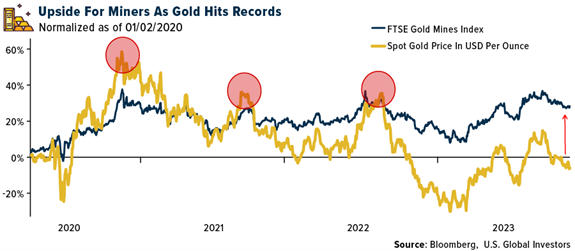

Frank E Holmes
Frank Holmes is CEO and chief investment officer of U.S. Global Investors, Inc., a boutique investment advisory firm based in San Antonio that manages domestic and offshore funds specializing in the natural resources and emerging markets sectors. The company’s no-load mutual funds include the Global Resources Fund (ticker PSPFX), the World Precious Minerals Fund (UNWPX) and the Gold Shares Fund (USERX).
Please consider carefully the fund’s investment objectives, risks, charges and expenses. For this and other important information, obtain a fund prospectus by visiting www.usfunds.com or by calling 1-800-US-FUNDS (1-800-873-8637). Read it carefully before investing. Distributed by U.S. Global Brokerage, Inc.
All opinions expressed and data provided are subject to change without notice. Some of these opinions may not be appropriate to every investor. Foreign and emerging market investing involves special risks such as currency fluctuation and less public disclosure, as well as economic and political risk.
The S&P/TSX Global Gold Index is an international benchmark tracking the world’s leading gold companies with the intent to provide an investable representative index of publicly-traded international gold companies. The FTSE Gold Mines Index Series encompasses all gold mining companies that have a sustainable and attributable gold production of at least 300,000 ounces a year, and that derive 75% or more of their revenue from mined gold.
Holdings as a percentage of net assets as of 6/30/07: Jiangxi Copper (China Region Opportunity Fund 1.74%); Silvercorp Metals Inc. (World Precious Minerals Fund 2.78%, Global Resources Fund 0.89%, China Region Opportunity Fund 2.42%); Gold Fields Ltd. (Gold Shares Fund 6.05%, World Precious Minerals Fund 2.58%, Global Resources Fund 0.39%); Sino Gold Mining Ltd. (Gold Shares Fund 1.03%, World Precious Minerals Fund 0.58%, China Region Opportunity Fund 0.27%); Anglogold Ashanti (0.0%); Dynasty Gold (0.0%).